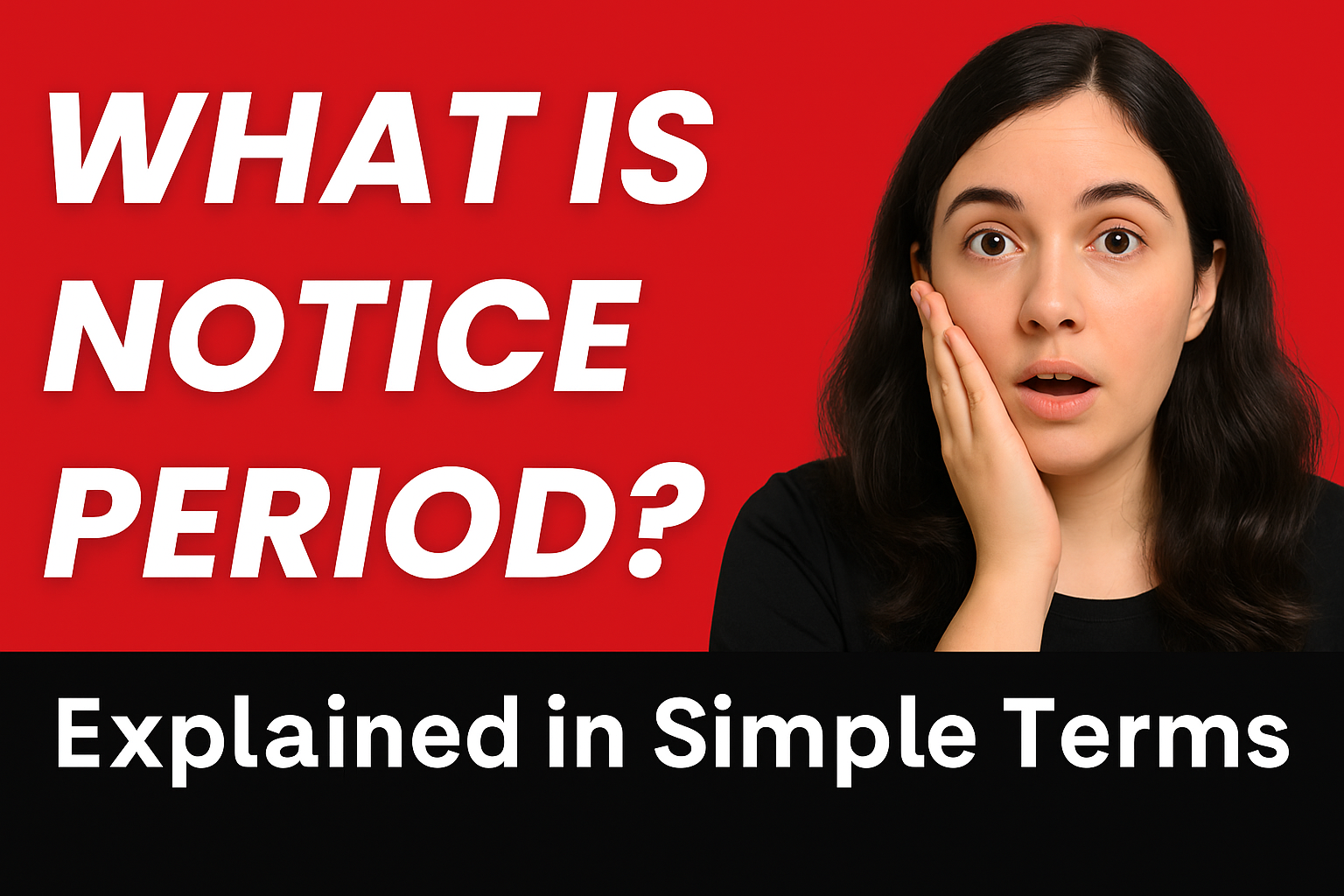Confused about what a notice period means in a job? Learn everything you need to know—from duration, purpose, rules, and tips for a smooth exit from your company.
If you’re planning to switch jobs, quit your current role, or are simply new to the working world, chances are you’ve come across the term “notice period.” But what does it really mean, and why is it such an important part of professional life?
In this blog, we’ll explain everything about the notice period in a job—what it means, why it matters, how long it usually is, and what happens if you skip it.
Table of Contents
🧠 What Does “Notice Period” Mean?
The notice period is the time between when you resign from your job or are asked to leave—and your last working day at the company.
Think of it as a professional heads-up. Instead of leaving immediately, you continue working for a set period (usually a few weeks or months) so that your employer has time to find a replacement or manage the work transition.
🤔 Why Is a Notice Period Important?
A notice period benefits both the employee and the employer. Here’s why:
- 👨💼 For Employers:
It gives them time to find and train someone new, or to redistribute your responsibilities. - 👩💻 For Employees:
It lets you leave on good terms, finish your tasks properly, and get a positive reference. - 🧾 Legally and Financially:
Not serving your notice period might affect your full and final settlement, experience letter, or future job opportunities.
⏳ How Long Is the Notice Period in Most Jobs?
There’s no single rule—it depends on your company, role, and whether you’re in a probation period or a permanent employee. However, here are common durations:
| Situation | Typical Notice Period |
|---|---|
| During probation | 7 to 15 days |
| After confirmation | 1 to 3 months |
| Senior positions | 2 to 3 months or more |
Always check your offer letter or employment contract—the exact duration is usually mentioned there.
🧾 Types of Notice Period
Let’s break it down into the different types you might encounter:
1. Notice During Probation
If you’re still under probation (usually the first 3–6 months of a job), the notice period is shorter—about 1 to 2 weeks.
2. Notice After Confirmation
Once you’re a confirmed employee, you may be expected to serve a longer notice—usually between 1 to 3 months.
3. Immediate Resignation
Sometimes employees request to leave immediately due to personal reasons. Companies may allow this by:
- Accepting a notice period buyout (you pay for the unserved days), or
- Waiving it off entirely, depending on the situation.
4. Termination by Company
Even employers are expected to give notice (or pay in lieu of notice) when terminating employees, especially in permanent roles.
⚠️ What Happens If You Don’t Serve Your Notice Period?
Skipping your notice period might sound tempting, especially if you’re eager to join a new job. But here are the risks:
- ❌ No full & final settlement (salary, PF, etc.)
- ❌ No experience or relieving letter
- ❌ Negative impression on future employers
- ❌ Possible legal consequences (rare, but possible if under contract)
Some companies offer a notice period buyout option where the employee pays an amount equal to the unserved days and leaves early.
🔄 Can You Reduce or Negotiate the Notice Period?
Yes, it’s often possible. Here’s how you can try:
- 🗣️ Request HR or your manager politely with valid reasons.
- 💸 Offer a buyout of the remaining days.
- 📑 Refer to your contract for flexible terms.
- 🤝 Negotiate with your new employer to join a bit later if needed.
Remember—being honest and respectful goes a long way.
💡 Tips to Serve Your Notice Period Smoothly
- ✅ Stay focused and finish all pending tasks.
- 📋 Document important processes and information for your replacement.
- 🧑🏫 Help with knowledge transfer if required.
- 🤝 Maintain good relationships—don’t bad-mouth your employer.
- 🙌 Leave gracefully. Your last impression is just as important as your first.
✨ Final Thoughts
The notice period isn’t just a rule—it’s a professional courtesy and a sign of mutual respect between an employee and employer.
Whether you’re leaving your first job or a senior position, how you serve your notice period reflects your work ethic, professionalism, and attitude. So make it count!
📌 Bonus: Quick FAQ
Q: Can my employer force me to serve the full notice period?
A: If it’s in your contract, yes. But most companies are open to negotiation.
Q: Is the notice period paid?
A: Yes, you receive your regular salary during this time.
Q: Can I use leave during the notice period?
A: Usually not, unless approved by your manager. It may also extend your notice period.
